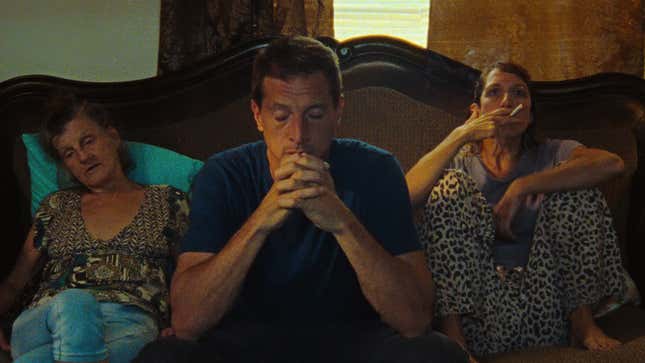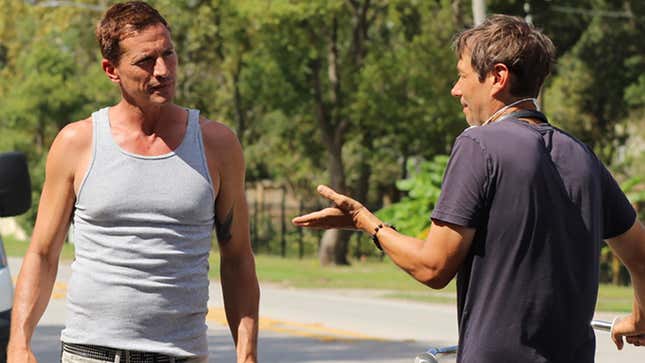Red Rocket Director Sean Baker on Depicting Poor People While Avoiding the Trappings of ‘Poverty Porn’
"When it comes to characters, as a storyteller, you have to have empathy or what are you doing?," said the writer-director in an interview with Jezebel
EntertainmentMovies
Image: A24 (via Cinetic Marketing & PR)
“My own politics [aren’t] important here,” Red Rocket director/co-writer Sean Baker said earlier this year during the Cannes Film Festival press conference that accompanied the premiere of his fifth feature. But for someone who isn’t particularly interested in talking about his politics, Baker is more than happy to discuss the politics—and their implications—within his new film.
Red Rocket is the latest in Baker’s string of films that examine lives typically absent from Hollywood stories, following 2015’s Tangerine and 2017’s The Florida Project. This one takes place in a depressed community in Galveston, Texas, where former porn performer Mikey Saber (in a career-best performance from Simon Rex) returns to crash with his ex, fellow porn refugee Lexi (Bree Elrod) and her mother Lil (Brenda Deiss). Mikey is as charismatic as he is amoral, seeking to exploit every situation and person he comes across for his own gain. Quickly, a 17-year-old who works at a donut shop and goes by the name of Strawberry (Suzanna Son) becomes one of those people. Mikey strikes up a relationship with her, deciding that getting her into porn (the industry that both he and his wife have fled, seemingly penniless) is his ticket out of Galveston.
Baker said that Mikey was inspired by the “suitcase pimp” archetype he witnessed while researching his 2012 film Starlet—the type of guy who’s somewhere between a hanger-on and a manger for a woman in porn. As Baker explains in the Red Rocket press notes: “Their lives are all about exploitation and using the women they’re with. The women make thousands while the men are making hundreds at best. So they have to live off the women, financially. There’s a self-denial, a holier-than-thou attitude, an obliviousness, an ignorance that these guys have.” Red Rocket luxuriates in a moral gray area because Baker believes that it’s more truthful to how actual people live their lives. Whenever I’ve heard Baker discussed by people who have worked or dealt with him in the industry, the word “nice” comes up repeatedly to describe him. This checks out. I found Baker to be intellectually generous. While some directors are uncomfortable revealing too much about their intentions and would rather let their movies play as people interpret them, Baker gamely discussed the issues informing his depiction of poor people and sex workers, MeToo, and the concept of poverty porn. All that and more is in the transcript of our conversation below, which was edited for length and clarity.
JEZEBEL: So often when I read people writing about your work, it’s described as depicting lives on the fringes. Do you agree with that?SEAN BAKER: To a certain degree. There is that [idea] that’s like, “Sean’s focusing on marginalized people and marginalized communities,” and yeah, to a degree, I guess. But it’s never, let’s say, a full-out intentional thing. It’s not like I’m looking for the next microcosm to focus on, or like, “Where’s the underrepresented community that I can make my next film?” It’s never like that. It’s an organic process that usually comes from me just interested in either an issue or perhaps a location, or perhaps I’ve heard stories from just doing research. For example, that’s how Red Rocket came about: Doing research in the adult film world way back when I was making a film called Starlet, finding an archetype, and wanting to really tackle that as a character study, because I hadn’t seen it before. So there’s also that: what I haven’t seen before or what I’m seeing too little of in U.S. film and TV. Essentially, what I want to see more of.
I also think that it’s kind of telling to say “on the fringes,” because that indicates a fixed perspective. The types of characters who populate Red Rocket make up a large part of America, and I don’t think they’d consider where they are to be “the fringes.”
True. And part of the reason that they are on the fringes and are unrepresented is because they’re not being represented. I think the more that our stories are told about people on the margins, the less they will be on the margins simply because hopefully, it’ll lead to a greater acceptance, a greater interest, a greater empathy.
I think the more that our stories are told about people on the margins, the less they will be on the margins.
It seems like such an obvious thing to do, really. Have you ever thought about why you’re an outlier despite simply being invested in the creative imperative to tell stories that haven’t been told?
-

-

-

-

-

-

-

-

-

-

-

-

-

-

-

-

-

-

-

-

-

-

-

-

-

-

-

-

-

-

-

-

-

-

-

-

-

-

-

-









































